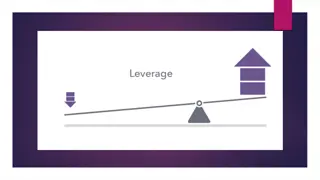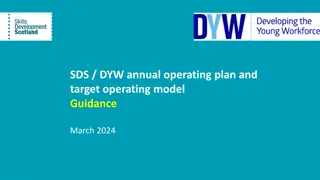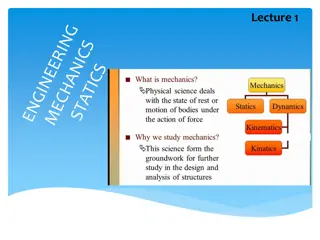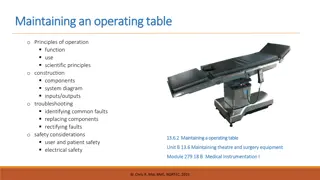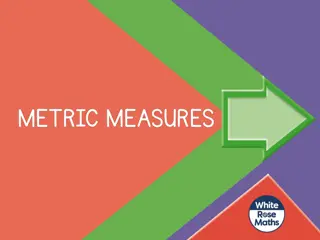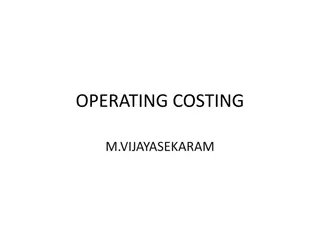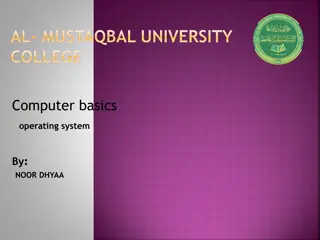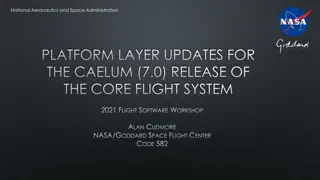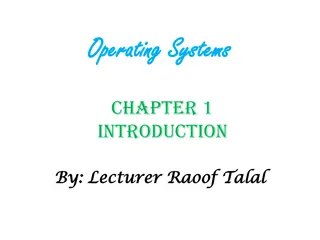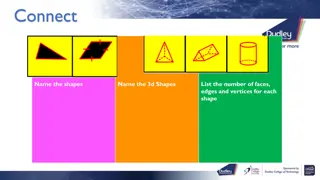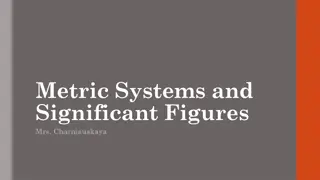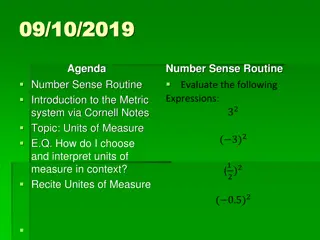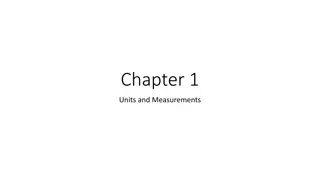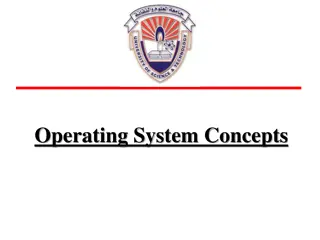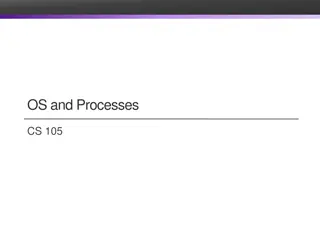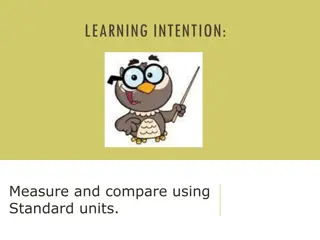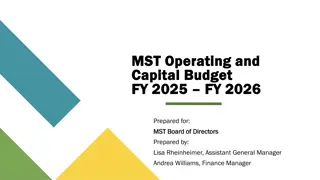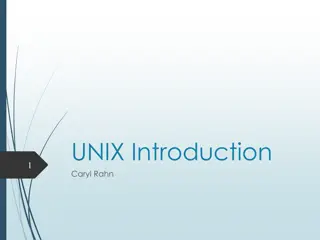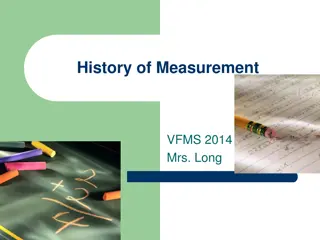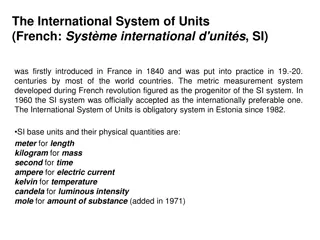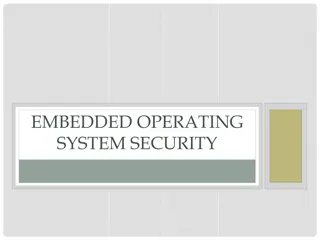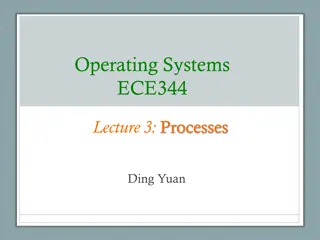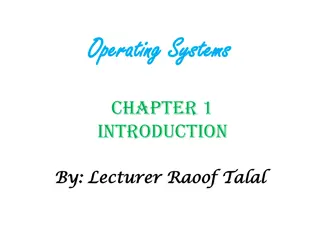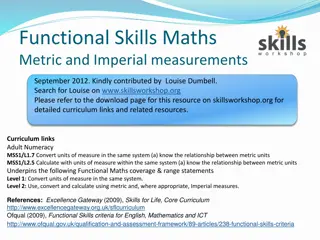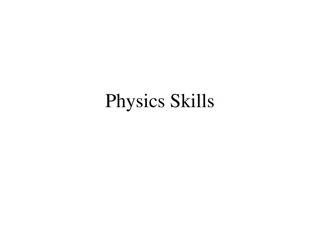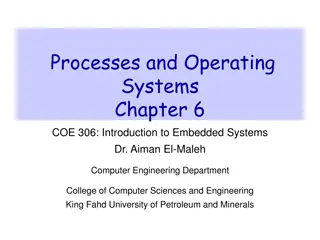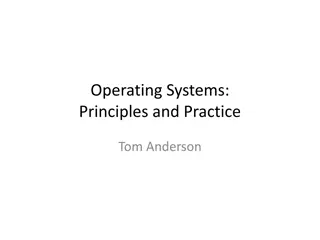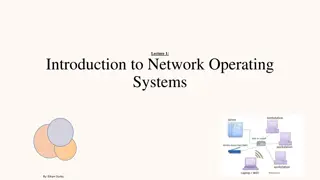Multiplying recruiting units
This presentation delves into the key relationships between church growth and the number, age, and mission of church units, emphasizing the correlation between membership strength and the number of units. It also discusses the importance of starting new churches for denominational growth, Sunday sch
2 views • 28 slides
Understanding Leverage and Operating Leverage in Financial Management
Leverage in financial management refers to using assets or funds with fixed costs to analyze the impact of debt and equity mix on shareholder returns and risk. Operating leverage focuses on leveraging fixed operating costs to amplify profit changes with sales variations, measured by the degree of op
2 views • 6 slides
Operating Systems
An operating system is a crucial program that manages all other programs on a computer. It handles tasks like input recognition, file management, and device control. There are different types of operating systems such as single-user, single-task systems, multi-user, multi-task systems, real-time ope
6 views • 11 slides
SDS/DYW Annual Operating Plan and Target Operating Model Guidance - March 2024
This guidance outlines the development of an Annual Operating Plan and Target Operating Model (TOM) to enhance collaboration and improve outcomes for young people. It emphasizes aligning planning activities, co-designing learner experiences, and maximizing collective resources through strategic part
1 views • 9 slides
Fundamentals of Mechanics: Introduction to Basic Quantities and Units
Explore the foundational concepts of mechanics in this introductory lecture, covering basic quantities like length, time, mass, and force. Learn about idealizations, units of measurement, SI units, conversion of units, and prefixes used in the context of mechanics.
1 views • 7 slides
Maintaining an Operating Table: Principles and Functions
An operating table system comprises three components - the table column, table top, and transporter, each available in different versions for various surgical disciplines. Stationary tables are anchored to the floor, offering flexibility to adapt to patient needs. Mobile tables provide maneuverabili
0 views • 12 slides
Understanding Customary Units of Capacity
Explore the world of customary units of capacity including ounces, cups, pints, quarts, and gallons. Learn how these units are used in measuring liquids, such as fluid ounces, cups, pints, and more. Dive into the fascinating story of the kingdom of GALLON and its royal family. Discover practical exa
0 views • 15 slides
Understanding Metric Measurements and Units
Exploring various metric units for measuring length, mass, and capacity. Matching lengths to sensible estimates, defining mass, length, and capacity, and sorting metric units into appropriate categories. Determining the most suitable units to measure mass and capacity for different objects and estim
0 views • 14 slides
Understanding Operating Costing in Service Industries
Operating costing is a method utilized by service-oriented businesses to ascertain the costs of providing services. Industries such as transportation services, welfare services, utility suppliers, and municipal services find operating costing beneficial. The method involves classifying costs into th
0 views • 6 slides
Understanding Operating Systems: Basics and Types
An operating system is essential software that manages a computer's hardware and software, allowing users to interact with the computer. Learn about the functions of an operating system, its importance, types available such as Microsoft Windows and macOS, and how they impact different devices. Disco
1 views • 11 slides
NASA Platform Layer Updates for the CAELUM (7.0) Release
The National Aeronautics and Space Administration (NASA) discusses platform layer updates for the CAELUM (7.0) release of the Core Flight System in the 2021 Flight Software Workshop. The platform layer consists of the Operating System Abstraction Layer (OSAL) and Platform Support Package (PSP), whic
1 views • 20 slides
Understanding Operating Systems: Introduction and Functions
An operating system plays a crucial role in managing computer hardware and facilitating user-computer interactions. It serves as an intermediary between users and hardware components, ensuring efficient resource allocation and control. The operating system coordinates the use of hardware resources b
5 views • 16 slides
Understanding Metric Units of Measurement in Mathematics
Explore the world of metric units in mathematics through the measurement of length, weight, and capacity. Learn about converting between units and applying these concepts to real-world scenarios. Discover the properties of shapes and delve into 3D shapes by counting faces, edges, and vertices. Engag
1 views • 21 slides
Understanding Metric Systems and Significant Figures
Scientists worldwide use the SI system to communicate clearly, based on units like meter, gram, and liter. Learn about base and derived units, SI base units like second and kilogram, and derived units like volume. Discover which unit (millimeter, centimeter, meter, or kilometer) to use for different
0 views • 36 slides
Understanding Units of Measure in Math and Science
Introduction to units of measure including the metric system and US/Customary system. Learn about the basics of measuring length, volume, weight, and mass. Explore different units such as meters, liters, and grams, and understand the importance of choosing and interpreting units in various contexts.
0 views • 17 slides
Understanding Units and Measurements in Physics
Physics is the study of nature and its phenomena, involving various physical quantities like mass, length, time, area, and volume. These quantities can be fundamental or derived, with units selected as standards for measurement. The System International (SI) units offer advantages like coherence, ra
0 views • 14 slides
Understanding Operating Systems: Functions and Evolution
Operating systems are essential software that enable computers to function effectively by managing hardware resources and facilitating communication between applications and hardware. This article covers the basics of operating systems, their structure, evolution, functions, and types. It also explo
2 views • 23 slides
Understanding Operating System Concepts: Lecture Overview and Services
Exploring the lecture content on operating system concepts, structures, services, system calls, and file manipulation. Delve into the importance of operating system services, error detection, program execution, I/O operations, protection, security, and resource allocation in operating systems. Learn
4 views • 26 slides
Academic Planning Training Summit Exec Order 1071 - Units & Concentrations
Explore Executive Order 1071 delegating authority for subprograms in academic planning. Learn about counting units, adding concentrations, and major requirements. Guidance documents and comparisons help understand the core curriculum and exclude elective units. Dive into discipline major units, conc
0 views • 12 slides
Introduction to Masonry Units in Construction
Masonry units, such as stone, blocks, or bricks, combined with mortar, are essential in construction, with examples seen in the pyramids of Egypt and the Great Wall of China. Structured and non-structured masonry types serve different purposes, with concrete masonry units being widely used. Solid co
1 views • 33 slides
Understanding Scientific Method and Units in Chemistry.
Learn about designing controlled experiments, identifying variables, and understanding constants through scenarios involving bacteria cultures and pizza grease comparison. Explore the differences between theory and law in scientific context, and discover the base units and metric units used in chemi
2 views • 30 slides
Introduction to Operating Systems and Processes
In this informative content, we delve into the fundamental concepts of operating systems (OS) and processes. Operating systems are essential software that manage a computer's resources for users and applications. We explore the core functionalities of an OS, such as resource allocation, isolation, c
0 views • 41 slides
Proposed Stock Complex Amendments for Caribbean Reef Fishery Management Units
Amendments proposed for the reef fishery management units in Puerto Rico and the U.S. Virgin Islands include changes to stock complexes for parrotfish, grouper, and snapper units. The proposal suggests separating parrotfish units, modifying grouper units, and adjusting snapper units. Additionally, t
4 views • 72 slides
Measurement Comparison Activities for Learning Standard Units
Engage in interactive activities to practice measuring and comparing using standard units like centimeters, millimeters, meters, and kilometers. Test your knowledge with true or false questions and choose the correct units for various objects. Enhance your understanding of measuring tools and units
0 views • 20 slides
Understanding Volume Measurement in Metric Units
Explore the concept of volume measurement in metric units through lessons on English vs. metric units, measuring liquid volume with graduated cylinders, and calculating solid volume using formulas. Understand the relationship between liters, milliliters, and other units, and learn practical techniqu
0 views • 6 slides
MST Operating and Capital Budget FY 2025 Summary
The MST Operating and Capital Budget for FY 2025 focuses on maximizing revenues, increasing bus advertising rates, promoting transit services, seeking grants for capital projects, and maintaining stable staffing levels. The budget priorities also include operating a Better Bus Network at Board-adopt
0 views • 10 slides
Walton High School Academic Program & Graduation Requirements
Walton High School aims to educate, inspire, and empower students in the Class of 2028 through a structured academic program. The school follows a 7-period day system where students take six classes and have lunch. With a total requirement of 24 units over four years, each class earns 0.5 units of c
0 views • 33 slides
Understanding UNIX Operating System
UNIX is a versatile operating system that enables multi-user access, multitasking, and portability across various computing environments. It serves as the foundation for many modern operating systems and has influenced concepts incorporated in Microsoft Windows and DOS. The UNIX system comprises dis
0 views • 51 slides
Evolution of Measurement Systems Over Time
Explore the fascinating journey of measurement systems from historical units like cubit and fathom to the modern metric system. Discover how civilizations developed standardized units for length, weight, and mass. Follow the timeline of measurement advancements, from King Edward's iron ulna to the b
0 views • 36 slides
Introduction to Linux: Course Overview and Objectives
This introduction to Linux course provides a comprehensive overview of operating systems, including the history, variations, user interface, and essential commands. The course is designed with lectures, labs, and exercises to help participants gain a better understanding of Linux and its practical a
0 views • 77 slides
Evolution of the International System of Units (SI) and Its Base Units
The International System of Units (SI) was introduced in France in 1840 and became globally accepted by the mid-20th century. SI is mandatory in Estonia since 1982, with base units including meter, kilogram, second, ampere, kelvin, candela, and mole. Each base unit is defined by specific physical co
0 views • 22 slides
Understanding Embedded Operating System Security
Embedded operating systems are designed for special purposes with limited resources and small sizes, found in various devices like ATMs, smartphones, cars, and more. Common operating systems include VxWorks, Windows, QNX, and SCADA, with different applications and requirements. Windows CE stands out
0 views • 21 slides
Understanding Processes in Operating Systems - ECE344 Lecture 3 Summary
This lecture delves into the essential concepts of processes, threads, and synchronization in operating systems. Key topics covered include units of execution, representation of units of execution in the OS, process execution states, and state transitions. Users, programs, and the role of processes
0 views • 45 slides
Understanding Operating Systems: An Introduction and Overview
An operating system is a crucial program that manages computer hardware and serves as an intermediary between users and hardware. This chapter explores the role of operating systems in a computer system, covering components like hardware, application programs, and users. It delves into how operating
0 views • 16 slides
Understanding Metric and Imperial Measurements in Maths
Explore the world of metric and imperial measurements in mathematics, covering units for length, mass, and capacity. Learn conversion rates and relationships between different units, enhancing your functional maths skills at levels 1 and 2. Discover the significance of milli-, centi-, and kilo- pref
0 views • 11 slides
Understanding Units of Measurement in Physics
Explore the world of physics through the lens of units of measurement, including the Metric System and MKS/SI base units. Learn about the standard kilogram, meter, and second, as well as derived units and the process of converting units in the Metric System.
0 views • 22 slides
Introduction to Processes and Operating Systems in Embedded Systems
Processes and operating systems play a crucial role in building complex applications on microprocessors, offering flexibility to meet timing requirements. The operating system (OS) manages processes by providing mechanisms for switching execution between them. Real-Time Operating Systems (RTOS) are
0 views • 65 slides
Understanding Operating Systems: Principles and Practice in CSE Curriculum
Dive into the world of operating systems through the lens of "Operating Systems: Principles and Practice" by Tom Anderson. Discover how this course fits in the UW CSE curriculum, covering systems programming, operating system interfaces, and distributed systems. Explore the project work on building
0 views • 21 slides
An Overview of Network Operating Systems and Multitasking
This informative content discusses the services of network operating systems, multitasking concepts, essential components, client and server software elements, and network services. It explains the two forms of multitasking - preemptive and nonpreemptive - and their functions within operating system
0 views • 48 slides
Overview of Network Operating Systems and Their Features
Network operating systems are essential software that manage computer resources and provide services for programs. This lecture covers the types of computers in a network, features of operating systems such as process and memory management, disk and file systems, and networking capabilities. Underst
0 views • 27 slides

